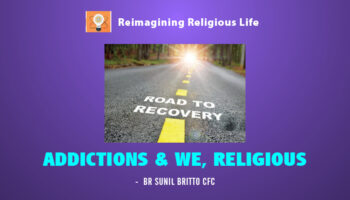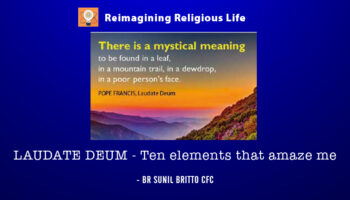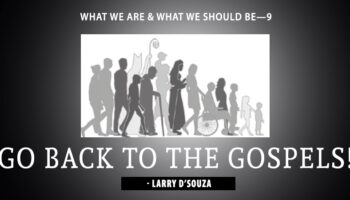ADVENT & CHRISTMAS
Advent means ‘coming.’
Whose coming it is, we already know.
Are we simply pretending or being childish when we say or sing, “Oh come, oh come…” etc?
After all, Jesus is not going to be born again on December 25 (nor die again in March or April).
Is a religious feast simply a childish fantasy, which adults should give up?
No.
A feast has two levels of meaning: Recalling a past event and living its spiritual meaning.
The past event—the birth of a historical person called Jesus—is something that most people, of any faith, have no problem with. The Muslims, for instance, venerate Jesus as a prophet. (They also have high regard for Miriam, His mother.) Hindus revere Jesus. Many pray to Him and to Mary.
The religious meaning of the feast is what is more important.
To welcome God who comes to us today, who wants to be close to us.
Hence Advent (spiritual preparation) and the religious celebration of Christmas.
We need to put “Christ into Christmas,” lest four smaller c’s take up all our attention: crib, carols, cards and cakes.
And so…
A.) Letting Christ Come In:
- Is my attention during Advent and Christmas mostly on Christ, or on the four small c’s?
- What do we do to welcome Christ more fully into our personal and family life and into our public commitments?
- None of us is fully Christian. There are areas of our heart where we have not let Christ come in, where we keep Him out.
- Which are these areas in my life? Where do I need to change?
- How would my life be if I were to welcome Jesus more fully into my life?
- In what ways is Christ asking for shelter and welcome in the world today?
B.) Making Christmas Customs Meaningful:
- What kind of Christmas cards do I send? Commercial ones with pictures of snow and reindeer, Santa Claus and pine trees, or with a picture of the Holy Family?
- In writing to my dear ones, do I simply send (or forward by email) an impersonal card, or take time to write a few personal lines (so that we bring some warmth and goodness to the other person)?
- In giving gifts, do we only think of those who give us gifts, or the truly needy?
- Do we get reconciled with those we have hurt, or who have hurt us, so that gathering around the crib is truly a loving celebration?
- Do we help our parishes to help the poorer members of the parish and other needy people to have at least a good meal on Christmas day?
- Do I volunteer to bring such help to the needy?
- Do I prepare myself and those in my care to prepare spiritually through prayer, a good confession and acts of generosity?
- Do I explain to my children and to others who may not know the meaning of Christmas and the crib—God so loved the world that He sent His only Son; He came to us in poverty, not in wealth and power; the first persons to whom the angels announced the news were simple shepherds (thus showing the dignity of poorer people); that the wise men came from far, thus showing the universality of God’s love; that Jesus took our poverty and hardships on himself, ….
C.) Examples we can learn from
- Parishes in which families “adopt” a poor family or person for Christmas, giving them gifts, including a shared meal.
- Spending Christmas in an orphanage or home for the destitute aged, serving the poor, and sharing their simple meals.
- Supporting shelter homes and orphanages that look after abandoned babies.
- Speaking up for the right of the unborn and of infants—preventing the murder of babies either in the womb or after birth.
- Writing a loving personal letter to one’s aged relatives or to a few sick or lonely persons. They will cherish it for years.
YEAR END
How do you conclude the year?
Here are suggestions:
Thank: Take time to thank God for the people in your life—especially those who love you and care for you. Appreciate the people who mean much to you. Don’t take goodness for granted.
Recall: Think of each person who entered your life this year. Thank God for them. See what you can learn from each of them. Write a personal note to them, or tell them what they have brought to your life.
See the good: Think of the good you have done this year. See how you can improve on this in the coming year. Your capacity to do good is a wonderful gift from God.
Apologize: Think of anyone you have hurt or disappointed or ignored. See what you need to do to set things right. Apologize. It shows greatness, not cowardice.
Get healed: Think of any hurts you experienced. Don’t keep them in, lest they poison your life. Forgive, and move on. They are minor, compared to all the love you experienced. So, too, we can learn from our painful experiences. They too a part of our human journey, something we are meant to learn from.
Clean up: It is a good idea to do a thorough cleaning of your house and office at least once a year. You will be surprised at the heap of useless things we accumulate, which no one has used for years.
Manage your expenses: Check your income and expenses of the past year. Are you happy with the way you are spending money? Do you need to change anything?
Give away: Each of us can give away some things to the needy: clothes, books, stationery, unused furniture, … You can either give them to some poor persons you know or donate them to centres that serve the poor. Another way is to give the nice things you want to spare as prizes for a raffle, with the money going to a deserving cause.
Check how used time and talents: Are you using your time and talents responsibly? Are you pursuing the truly important goals of life, or wasting energy on useless things?
End the year with God: Spend an hour in prayer to conclude the year and to start the new year with God. Many churches have prayer vigils, adoration, a midnight Mass, opportunities for confession. Do join. End the year with the God who gave you life and everything else these 366 days, and who was with you every moment of every day, and gives you the new year to fill with love.
To subscribe to the magazine Contact Us





